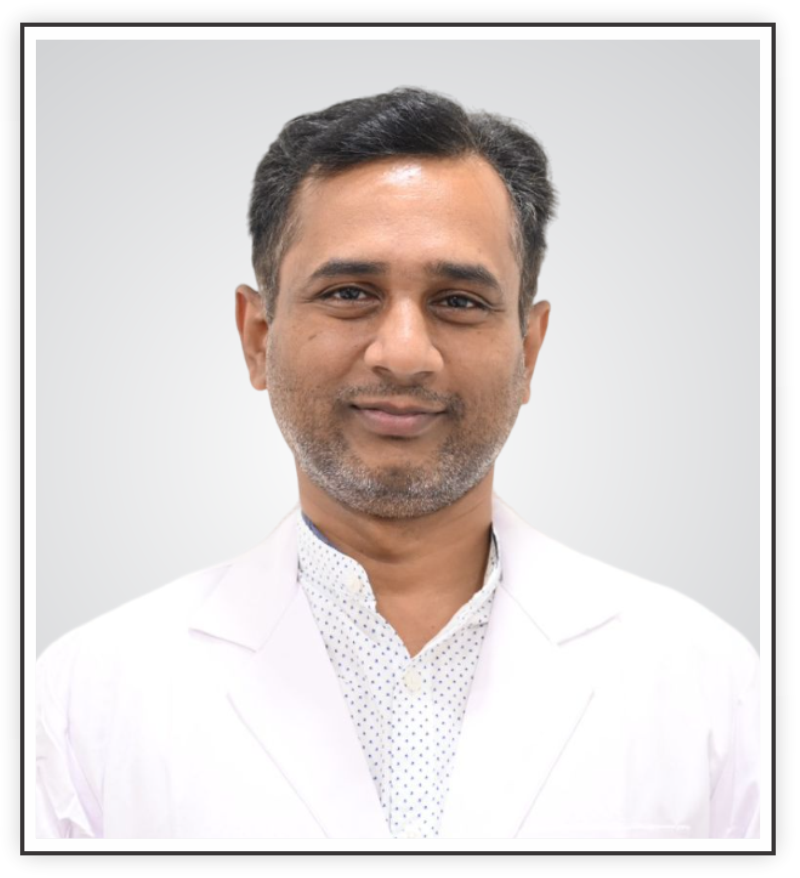 Department of Nephrology
Department of Nephrology
Best Nephrology Hospital in Hyderabad
Our tertiary care center for Nephrology offers a complete range of healthcare services for all kidney-related disorders and diseases like acute nephritic syndrome, acute renal failure, and chronic renal failure at Best Nephrology Hospital in Hyderabad.
Key conditions treated done at Best Nephrology Hospital in Hyderabad:
Diabetic Nephropathy:
Diabetic nephropathy is a complication of diabetes that occurs when high levels of blood sugar damage the blood vessels in the kidneys, leading to kidney damage and eventually kidney failure.
Symptoms of diabetic nephropathy may include swelling in the legs and feet, difficulty breathing, and increased urination at night as per Nephrologist in Hyderabad. Treatment for diabetic nephropathy may involve medications to manage blood sugar levels and blood pressure, as well as lifestyle changes such as a healthy diet and regular exercise.
Acute Kidney Injury Treatment at Best Nephrology Hospital in Hyderabad:
Acute kidney injury (AKI) is a sudden and rapid loss of kidney function that occurs over a period of hours to days. AKI can be caused by a variety of factors, including dehydration, infections, medications, and trauma. Symptoms of AKI may include decreased urine output, swelling in the legs or face, and confusion.
Treatment for AKI depends on the underlying cause and may involve addressing the underlying condition, such as rehydration for dehydration or discontinuing medications that are causing kidney damage. In severe cases, hospitalization and dialysis may be required to support kidney function.
Collagen Vascular Disease:
Collagen vascular disease refers to a group of conditions that affect the connective tissues in the body, including the kidneys. These conditions can include systemic lupus erythematosus (SLE), scleroderma, and rheumatoid arthritis. Collagen vascular diseases can cause inflammation and damage to the blood vessels and tissues in the kidneys, leading to kidney damage and eventually kidney failure consult Best Nephrology Hospital in Hyderabad.
Symptoms of collagen vascular diseases may include joint pain and swelling, skin rashes, and fatigue as per Nephrologist in Kachiguda. Treatment may involve medications to manage inflammation and immune system dysfunction, as well as regular monitoring of kidney function.
Chronic Kidney Disease:
Chronic kidney disease (CKD) is a long-term state in which the kidneys slowly lose process over time. CKD is a common condition and can be caused by a variety of factors, including diabetes, hypertension, and glomerular diseases. Symptoms of CKD may include fatigue, swelling in the legs or face, and decreased urine output.
Treatment for CKD may involve medications to manage underlying conditions and to slow the progression of kidney damage, as well as lifestyle changes such as a healthy diet and regular exercise. In severe cases, kidney dialysis or transplantation may be necessary.
Glomerular Diseases:
Glomerular diseases refer to a group of conditions that affect the glomeruli, the tiny blood vessels in the kidneys that filter waste and excess fluids from the blood. These conditions can include glomerulonephritis, which occurs when the glomeruli become inflamed, and nephrotic syndrome, which occurs when the glomeruli become damaged and leak protein into the urine.
Symptoms of glomerular diseases may include blood in the urine, foamy urine, and swelling in the legs or face. Treatment for glomerular diseases may involve medications to manage inflammation and proteinuria, as well as lifestyle changes such as a healthy diet and regular exercise suggested at Best Nephrology Hospital in Hyderabad.
Immunological kidney diseases:
Immunological kidney diseases refer to conditions in which the immune system mistakenly attacks and damages the kidneys, leading to inflammation and kidney damage. These conditions can include autoimmune diseases such as lupus nephritis, which occurs when the immune system attacks the kidneys in people with systemic lupus erythematosus (SLE), and vasculitis, which occurs when the immune system attacks the blood vessels in the kidneys at Best Nephrology Hospital in Hyderabad.
Symptoms of immunological kidney diseases may include swelling in the legs or face, foamy urine, and high blood pressure. Treatment for immunological kidney diseases may involve medications to suppress the immune system and reduce inflammation, as well as lifestyle changes such as a healthy diet and regular exercise.
Cystic Kidney Disease:
Cystic kidney disease refers to a group of genetic conditions in which cysts, or fluid-filled sacs, form in the kidneys, leading to kidney damage and eventually kidney failure. These conditions can include polycystic kidney disease, which is the most common type of cystic kidney disease and is characterized by the growth of multiple cysts in the kidneys.
Symptoms of cystic kidney disease may include high blood pressure, pain in the back or abdomen, and urinary tract infections. Treatment for cystic kidney disease may involve medications to manage high blood pressure and infections, as well as lifestyle changes such as a healthy diet and regular exercise. In severe cases, kidney dialysis or transplantation may be necessary suggested by Best Nephrology Hospital in Hyderabad.
Obstructive Nephropathy:
Obstructive nephropathy is a condition in which a blockage in the urinary tract, such as a kidney stone or tumour, prevents urine from draining properly from the kidneys, leading to kidney damage and eventually kidney failure. Symptoms of obstructive nephropathy may include pain in the back or abdomen, decreased urine output, and swelling in the legs or face.
Treatment for obstructive nephropathy may involve procedures to remove the blockage, such as surgery or lithotripsy, which uses shock waves to break up kidney stones. In severe cases, kidney dialysis or transplantation may be necessary for more visit Best Nephrology Hospital in Hyderabad.
Renal stone diseases:
Renal stone diseases refer to the formation of kidney stones, which are hard, mineral-based deposits that form in the kidneys and can cause pain and discomfort as they pass through the urinary tract. Kidney stones can vary in size and shape and can be made up of different substances such as calcium, oxalate, uric acid, and cystine.
The formation of kidney stones is a complex process that involves a variety of factors, including dehydration, certain medical conditions, and certain medications. Symptoms of kidney stones may include severe pain in the back or side, nausea, vomiting, and blood in the urine.
Cure for kidney stones relies on the extent and area of the stones. Small stones may be able to pass through the urinary tract on their own with adequate hydration and pain management, while larger stones may require medical intervention such as extracorporeal shockwave lithotripsy (ESWL), ureteroscopy, or percutaneous nephrolithotomy (PCNL) visit Best Nephrology Hospital in Hyderabad.
Hypertension:
Hypertension, also known as high blood pressure, is a common disease that arises when the pressure of blood against the walls of the arteries is consistently too high. Over time, hypertension can lead to damage to the blood vessels and organs, including the kidneys. The kidneys play a vital role in regulating blood pressure, and hypertension can cause damage to the kidneys’ blood vessels, leading to kidney damage and eventually kidney failure.
Symptoms of hypertension may include headache, dizziness, and chest pain. Treatment may involve medications to manage blood pressure, lifestyle changes such as exercise and diet modifications, and regular monitoring of blood pressure at Best Nephrology Hospital in Hyderabad.
Renovascular diseases treated at Best Nephrology Hospital in Hyderabad:
Renovascular diseases refer to a group of conditions that affect the blood vessels that supply blood to the kidneys. These diseases can include renal artery stenosis, which occurs when the arteries that supply blood to the kidneys narrow, and renal vein thrombosis, which occurs when a blood clot forms in the renal vein.
Symptoms of renovascular diseases may include high blood pressure, decreased urine output, and swelling in the legs. Treatment may involve medications to manage underlying conditions, such as blood thinners for renal vein thrombosis, and in severe cases, surgery to repair or replace damaged blood vessels.
Urinary tract infections:
Urinary tract infections (UTIs) are a common condition that occurs when bacteria enter the urinary tract and cause infection. UTIs can affect different parts of the urinary tract, including the kidneys, and can cause damage to the kidneys if left untreated. Symptoms of UTIs may include pain or burning during urination, frequent urination, and cloudy or strong-smelling urine.
Treatment for UTIs typically involves antibiotics to clear the infection, as well as adequate hydration and pain management. If a UTI is left untreated and spreads to the kidneys, more aggressive treatment may be required, including hospitalization and intravenous antibiotics at Best Nephrology Hospital in Hyderabad.
Renal tubular disorders:
Renal tubular disorders are a group of conditions that affect the tubules in the kidneys, which are responsible for filtering waste and excess fluids from the blood. These disorders can include Fanconi syndrome, which occurs when the tubules in the kidneys fail to reabsorb certain nutrients and substances, and renal tubular acidosis, which occurs when the tubules in the kidneys fail to properly regulate the pH balance of the blood.
Symptoms of renal tubular disorders may include bone pain, muscle weakness, and fatigue. Treatment may involve medications and dietary changes to manage underlying conditions and prevent further damage to the kidneys visit Best Nephrology Hospital in Hyderabad.
Childhood (Pediatric) kidney diseases:
Pediatric kidney diseases refer to a variety of conditions that can affect the kidneys in children, including congenital kidney abnormalities, urinary tract infections, and glomerulonephritis. Symptoms of pediatric kidney diseases may include fever, blood in the urine, abdominal pain, and swelling in the legs or face.
Treatment for pediatric kidney diseases may involve medications, dietary changes, and in some cases, surgery as per Nephrologist in Kukatpally. Children with kidney diseases may also require ongoing monitoring and management by a pediatric nephrologist, a doctor who specializes in kidney diseases in children at Best Nephrology Hospital in Hyderabad.
Best Nephrologist in Hyderabad




